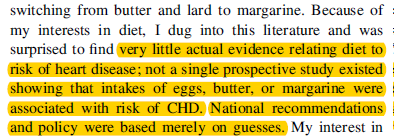
LOL. Right.
And how do you think the food environment gets shaped?
You don't have to "know" about the guidelines in order to be affected by them *across the socio-ecological model.*
They impact everything, including how we think about & define what is "healthy food."
And how do you think the food environment gets shaped?
You don't have to "know" about the guidelines in order to be affected by them *across the socio-ecological model.*
They impact everything, including how we think about & define what is "healthy food."
https://twitter.com/ChristianTams/status/1335270622302244867
Okay. Let's look at the food environment.
When the DGA created demand - which it did - for foods that had less fat, sodium, and cholesterol, what foods available for purchase changed.
in 1980, it was hard to find "low fat" yogurt. After a while, that's ALL you could find.
When the DGA created demand - which it did - for foods that had less fat, sodium, and cholesterol, what foods available for purchase changed.
in 1980, it was hard to find "low fat" yogurt. After a while, that's ALL you could find.
But when something gets removed from food, that doesn't mean it gets removed from the food SUPPLY.
The fat that used to be in dairy products could now be used to make cheeze cheep, leading to cheep supercheezy pizza.
The fat that used to be in dairy products could now be used to make cheeze cheep, leading to cheep supercheezy pizza.
The boom in demand for boneless skinless chicken breasts - instigated by the dietary guidelines - is DIRECTLY related to the availability of chicken wings for Buffalo chicken wing joints that opened up across the US.
So start by getting real about how a "food environment" comes about before you lecture me about how dietary guidelines can't affect eating habits because "no one even knows what they are." 🙄
• • •
Missing some Tweet in this thread? You can try to
force a refresh





